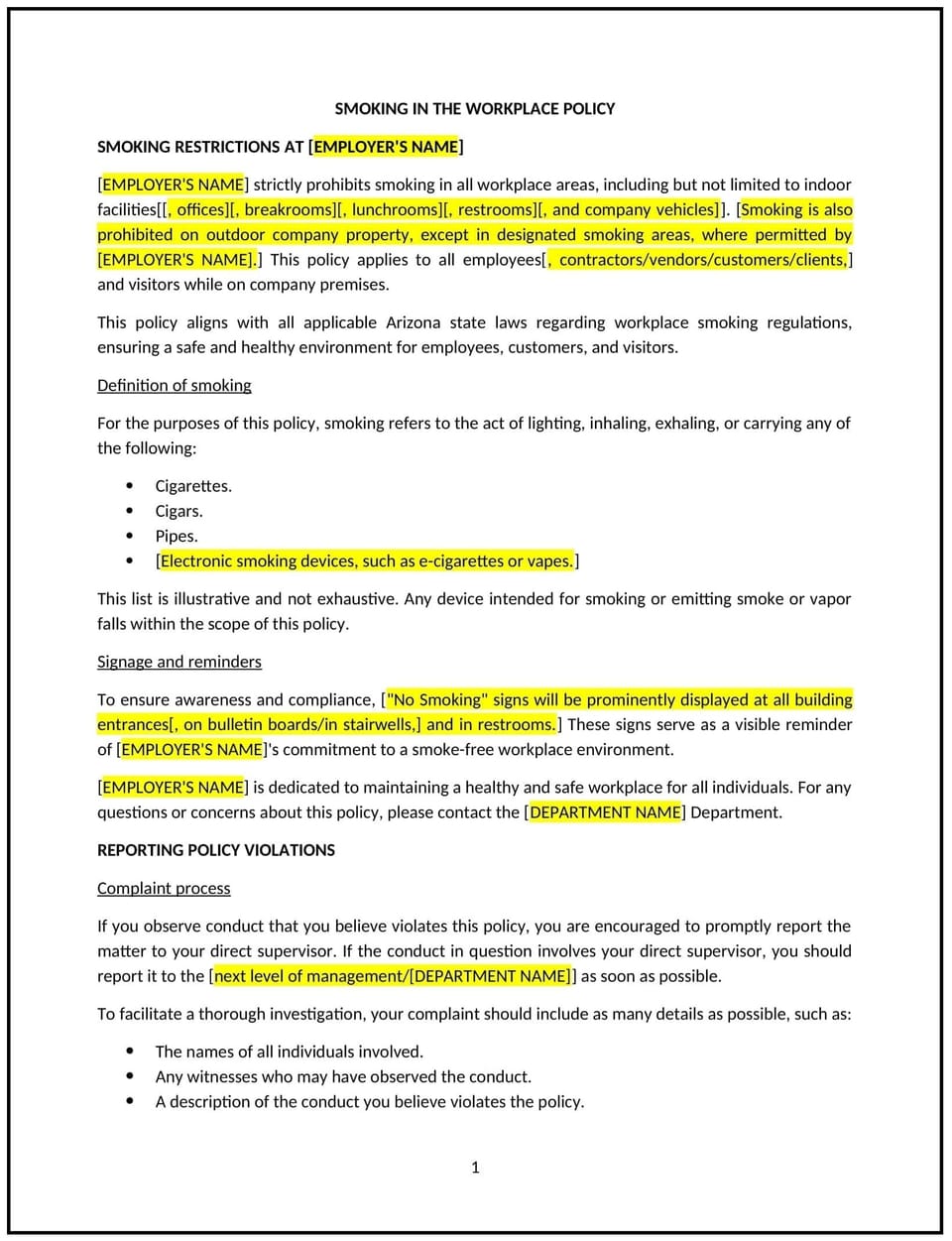Smoking in the workplace policy (Arizona): Free template

Smoking in the workplace policy (Arizona)
In Arizona, a smoking in the workplace policy provides guidelines for managing smoking activities in or around the workplace, supporting compliance with Arizona’s Smoke-Free Arizona Act and promoting a healthy and safe environment for all employees. This policy aims to minimize health risks, reduce distractions, and maintain a clean and professional workspace.
This policy outlines where smoking is prohibited, the designated smoking areas (if any), and the consequences for non-compliance. By implementing this policy, Arizona businesses can ensure a smoke-free work environment, promote employee well-being, and comply with state regulations.
How to use this smoking in the workplace policy (Arizona)
- Define smoking areas: Specify where smoking is allowed (e.g., designated outdoor areas) and ensure compliance with the Smoke-Free Arizona Act.
- Prohibit smoking in certain areas: Clearly state that smoking is prohibited inside the building, near entryways, in parking lots, and in other restricted areas as defined by law.
- Provide resources for cessation: Offer support or resources for employees who wish to quit smoking, such as wellness programs or counseling.
- Communicate expectations: Ensure employees understand the policy and the areas where smoking is permitted or prohibited.
- Address enforcement: Outline the consequences for employees who fail to comply with the smoking policy, such as warnings or disciplinary action.
Benefits of using a smoking in the workplace policy (Arizona)
This policy offers several advantages for Arizona businesses:
- Promotes health and safety: Reduces exposure to secondhand smoke and minimizes the risk of smoking-related health problems for employees.
- Ensures compliance: Aligns with the Smoke-Free Arizona Act and other local regulations, preventing potential legal issues.
- Enhances productivity: Minimizes smoking-related disruptions, such as excessive breaks or smoke-related complaints.
- Improves workplace environment: Creates a cleaner, fresher workplace that promotes employee comfort and well-being.
- Reduces health care costs: Encourages healthier lifestyle choices, which can lead to lower healthcare costs and fewer sick days.
Tips for using this smoking in the workplace policy (Arizona)
- Address Arizona-specific considerations: Incorporate the Smoke-Free Arizona Act’s specific requirements and local ordinances that may impact smoking restrictions.
- Educate employees: Ensure employees are informed of the policy during onboarding and periodically remind them of the policy through signage and internal communications.
- Designate clear smoking areas: Clearly mark outdoor smoking areas to keep the workplace clean and maintain proper distance from building entrances and windows.
- Support smoking cessation: Provide resources such as nicotine replacement programs or wellness incentives for employees who want to quit smoking.
- Review periodically: Update the policy as needed to reflect changes in law, employee health initiatives, or business needs.
Q: Where is smoking allowed in the workplace?
A: Smoking is only allowed in designated outdoor areas that are sufficiently far from building entrances and other restricted spaces, in compliance with the Smoke-Free Arizona Act.
Q: What are the consequences if employees violate the smoking policy?
A: Employees who violate the smoking policy may face disciplinary actions, ranging from warnings to termination, depending on the severity and frequency of the violation.
Q: Can employees smoke during breaks?
A: Yes, employees may smoke during designated breaks, but only in the approved smoking areas away from entrances, windows, or other restricted zones.
Q: Does the company offer smoking cessation programs?
A: Yes, the company may offer smoking cessation resources or programs, such as counseling or wellness incentives, to help employees quit smoking.
This article contains general legal information and does not contain legal advice. Cobrief is not a law firm or a substitute for an attorney or law firm. The law is complex and changes often. For legal advice, please ask a lawyer.


